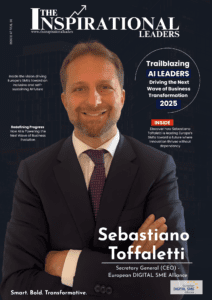Artificial Intelligence (AI) is no longer a futuristic concept. It is the driving force behind a new wave of transformation across industries, economies, and societies. For Europe’s small and medium-sized enterprises (SMEs), this transformation presents both a major opportunity and a significant challenge. At the center of this movement stands Sebastiano Toffaletti, Secretary General of the European DIGITAL SME Alliance, who has become one of Europe’s most influential voices in advocating for a fair, sovereign, and inclusive AI ecosystem.
Leading the largest network of tech SMEs in Europe, representing over 45,000 innovative companies through national and sectoral associations, Toffaletti is championing a vision that goes beyond technology adoption. His mission is to ensure that AI becomes a tool for empowerment, sovereignty, and sustainable growth across Europe’s SME landscape.
Redefining the Role of SMEs in the Age of AI
For Toffaletti, Artificial Intelligence is not simply a technological shift. It is redefining the very nature of competitiveness and innovation. “AI is redefining competitiveness for every business, but for SMEs, it is not just about adopting new tools; it is about reimagining their place in the digital economy,” he explains.
More than half of Europe’s creative companies, including those in gaming, audiovisual, and media, already use AI tools. However, other sectors such as industry and healthcare are still behind, with adoption rates averaging only 13 percent. This imbalance highlights both the challenge and opportunity ahead.
Toffaletti believes that the most sustainable way forward for small enterprises is not total dependence on large foreign AI systems but rather developing and training their own smaller, specialized language models. Open Source models are a good solution: They can be tailored to the company’s specific needs and data, and hosted securely in local cloud environments.
“If Europe ensures access to trustworthy, interoperable, and open AI solutions, SMEs can turn today’s technological dependency into tomorrow’s sovereignty opportunity, transforming Europe from a user to a producer of advanced AI,” he emphasizes.
A Vision Rooted in Sovereignty and Responsibility
Sebastiano’s commitment to empowering SMEs through AI stems from a simple yet powerful observation. Innovation often begins in small companies, but the ecosystem tends to favor large incumbents. “I have seen too many small innovators struggle and fail to exploit their potential because they depend on non-European infrastructures for computing, cloud, and data,” he reflects.
This reality inspired him to become a strong advocate for the responsible and sovereign adoption of AI within the SME ecosystem. Under his leadership, DIGITAL SME has been promoting a European approach that combines technological independence, open ecosystems, and ethical responsibility.
Over time, his vision evolved from raising awareness to building the infrastructure necessary to achieve technological sovereignty. “I was among the originators of the EuroStack movement, which brings together innovators, policymakers, and industry leaders around one goal: enabling Europe to build its own digital and AI stack, from chips to cloud to models. It is about ensuring that SMEs can innovate confidently, using European technologies built on European values,” he explains.
Unique Challenges and Hidden Advantages for SMEs
Integrating AI poses unique challenges for smaller companies compared to larger corporations. Toffaletti outlines three major barriers: limited access to data, lack of affordable computing infrastructure, and a shortage of AI talent.
Europe’s data protection regulations, though important for privacy, often create uneven conditions for smaller innovators. “Although European privacy laws have done little to stop U.S. and Chinese tech giants from tapping into citizens’ data, they still present major hurdles for smaller, emerging players,” he says. Moreover, valuable industrial and machine-generated data is often locked away by manufacturers that aim to protect market dominance, which prevents fair competition and innovation.
Computational power, a critical component for training AI models, is another major obstacle, with most resources still concentrated in the hands of global hyperscalers. Meanwhile, Europe continues to experience a shortage of skilled AI engineers and data scientists.
Despite these challenges, Toffaletti points out that SMEs have one undeniable advantage: agility. “They can innovate faster, experiment with open-source models, and deploy edge AI without the bureaucratic inertia of large corporations,” he says. His advice to smaller companies is practical and forward-thinking. “Run lightweight and air-gapped AI tools on local clouds. The greatest opportunity for SMEs lies in decentralized AI, where they can train models close to the data source and lead innovation in their domains, from smart farming to industrial robotics.”
DIGITAL SME: Empowering AI Adoption Across Europe
Under Toffaletti’s leadership, the European DIGITAL SME Alliance has become a cornerstone of Europe’s AI transformation efforts. The organization leads numerous EU initiatives designed to make AI more accessible to smaller innovators.
Through programs such as Testing and Experimentation Facilities (TEFs), AI-on-Demand, and the European Digital Innovation Hubs Network, DIGITAL SME connects SMEs with essential resources such as research, datasets, funding, and technical expertise. These networks, which include more than 150 hubs across Europe, offer services in data management, ethical AI testing, and support for AI deployment.
“We also advocate for fair access to public funding and data spaces in programs such as Digital Europe and Horizon Europe,” he adds. “As the recent EU Apply AI Strategy notes, many actions, from AI for the public sector to the AI Continent Action Plan, will only succeed if SMEs are fully involved.”
DIGITAL SME’s Focus Group on AI further strengthens this mission by enabling hundreds of small companies to co-create policy proposals, share technical knowledge, and test ethical frameworks. “We are turning dialogue into deployment,” Toffaletti says proudly.
Building Inclusive Growth Through Open AI Infrastructures
Artificial Intelligence has the power to drive both innovation and disruption. Ensuring inclusive growth remains one of Europe’s biggest challenges. “Inclusiveness starts with architecture, not afterthought,” says Toffaletti. “If AI infrastructures are open, interoperable, and affordable, SMEs will naturally be part of the growth story.”
The real risk, he warns, comes when AI becomes concentrated in the hands of a few hyperscalers that control not only the models but also the compute and data pipelines. To prevent this, DIGITAL SME continues to advocate for sovereign digital public infrastructures, including European cloud systems, data spaces, and open, multilingual foundation models.
Closing the skills gap is equally important. Citing a recent CEDEFOP survey, he notes that six in ten European workers will see significant transformation in their tasks due to AI, and 61 percent believe they will need new skills within five years. Yet only 15 percent have undergone AI-related training in the past year. “That is why Europe’s Union of Skills initiative, along with our SME-driven training programs, focuses squarely on empowering workers to adapt and grow, not replacing them,” Toffaletti explains.
AI Innovation on the Ground: Success Stories from Europe
Toffaletti’s optimism about Europe’s AI future is grounded in tangible achievements. One of the standout initiatives under DIGITAL SME’s umbrella is the Tech Sovereignty Catalogue (techsov-catalogue.eu). This community-driven platform highlights trusted, sovereign digital solutions developed in Europe. It showcases innovations in AI, data analytics, cloud, and connectivity, demonstrating that European companies are already delivering real-world impact.
A notable example is FuVeX, a Spanish SME featured in the catalogue. The company uses AI-powered drones to replace manned helicopters for power-line inspection. With support from the EU-funded project EUHubs4Data, FuVeX developed advanced AI systems for collision avoidance and super-resolution imaging, enabling safer, greener, and more efficient infrastructure monitoring.
“These innovations reflect the growing power of Europe’s AI ecosystem,” Toffaletti says, pointing to significant investment initiatives such as the €7 billion EuroHPC Joint Undertaking and around €200 billion in planned investments for AI factories and digital gigafactories under the InvestAI plan. Together, these initiatives are creating the computing, data, and industrial foundations for a truly sovereign AI future.
Shaping Ethical and Balanced AI Policies
Ethics and regulation play a crucial role in AI’s development, and Toffaletti has been at the forefront of shaping these frameworks. Under his leadership, DIGITAL SME has been a leading voice for Europe’s innovators throughout the AI Act negotiations, ensuring that regulations protect innovation while maintaining accountability.
“One major achievement was convincing legislators that startups that deploy OpenAI or other large models in their applications should share responsibility with model developers,” he explains. “This step significantly reduces compliance costs for smaller players.”
DIGITAL SME’s experts also contributed to drafting the Code of Practice for General-Purpose AI, which is being signed by major industry players, including OpenAI and Anthropic. In parallel, the Alliance collaborates with ETSI and CEN-CENELEC to turn ethical principles into practical technical standards, ensuring that compliance and interoperability remain accessible to all.
Toffaletti also emphasizes the need for a balanced approach to implementing the AI Act. Rushing enforcement without completed standards and functioning SME sandboxes could lead to uncertainty. “The law, set to apply in August 2026, should only take effect at least six months after these essential foundations are in place in every Member State,” he asserts.
The Power of Collaboration in Europe’s AI Ecosystem
For Toffaletti, collaboration is not a buzzword but a necessity. “Collaboration should be the cornerstone of Europe’s AI ecosystem,” he insists. SMEs bring agility and creativity, academia contributes research excellence, policymakers provide strategic vision, and larger corporations add scale and resources.
He has seen countless examples of SMEs joining forces, creating synergies that strengthen innovation and competitiveness. “These companies are fast, creative, and thrive when they find partners who complement their expertise and portfolio. It is always deeply rewarding to help broker these partnerships,” he says.
Still, he acknowledges that Europe has much to learn from other regions. “When I was in Silicon Valley, I was struck by how naturally and rapidly new collaborations form, sometimes in days rather than months,” he recalls. However, he believes Europe is catching up. The recent strategic partnership between ASML, the Dutch semiconductor leader, and Mistral, the French AI champion, is a perfect example of progress. “Behind the scenes, policymakers and industry leaders worked together toward a shared objective, overcoming national divisions and competing interests. That is the kind of collaboration Europe needs more of,” Toffaletti says.
Emerging AI Trends Shaping the Future of SMEs
Looking ahead to 2030, Toffaletti identifies several key trends that will shape SMEs and business ecosystems.
First, market concentration will likely intensify as global technology giants continue to consolidate control over the AI value chain, from chips and infrastructure to user interfaces. “By 2030, this consolidation could reach unprecedented levels, leaving SMEs dependent on a few dominant providers who control access to essential AI capabilities,” he warns.
Second, AI will increasingly act as a gatekeeper. As generative AI agents become the default interface for search, commerce, and productivity, they will determine what users see, buy, and interact with, reshaping competition itself.
Finally, Toffaletti believes the path forward for SMEs lies in specialization and sovereignty. “Not every company needs to develop foundation models, but every company can train or fine-tune existing open or sovereign AI models with its own data, hosted on trusted and local cloud infrastructure,” he explains. “This is where the real value lies: embedding domain-specific intelligence into products, services, and operations while keeping control over data and customer relationships.”
By 2030, the most successful SMEs will be those that master this balance, leveraging shared European AI resources while maintaining ownership of their intelligence.
Leadership in the AI Era: A Legacy of Empowerment
For Sebastiano Toffaletti, leadership in the AI era is not about control but empowerment. “Leadership in the AI era means having the courage to question dependency and the vision to build alternatives,” he reflects.
His mission is to empower Europe’s 25 million SMEs to innovate on their own terms, free from technological dependency. “If my legacy is to have helped shift the narrative from ‘Europe is falling behind’ to ‘Europe is building its own tech stack,’ that will be enough,” he concludes. “True leadership in technology is not measured by how much wealth it creates for a few, but by how effectively it unleashes the creativity of innovators to build technologies that empower people and serve society.”
Final Thoughts
Sebastiano Toffaletti’s leadership represents a defining moment in Europe’s digital transformation journey. Through the European DIGITAL SME Alliance, he is shaping policies, building ecosystems, and empowering innovators who will lead Europe into a sovereign, AI-powered future.
As the world accelerates toward an AI-driven economy, Toffaletti’s message is both clear and inspiring. Europe’s future lies not in dependency but in sovereignty, built by SMEs, for SMEs, and for the society they serve.EUHubs4Data




